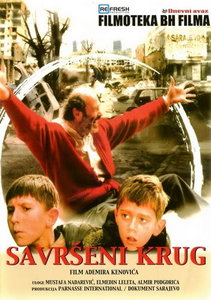The Perfect Circle
| The Perfect Circle (Savršeni krug) |
|
|---|---|
 |
|
| Directed by | Ademir Kenović |
| Screenplay by | Ademir Kenović Abdulah Sidran Pjer Žalica |
| Starring | Mustafa Nadarević |
| Music by |
Esad Arnautalić Ranko Rihtman |
| Cinematography | Milenko Uherka |
| Edited by | Christel Tanović |
|
Release date
|
24 August 1997 (Montreal World Film Festival) |
|
Running time
|
113 minutes |
| Country | Bosnia and Herzegovina |
| Language | Bosnian |
The Perfect Circle (Bosnian: Savršeni krug) is a 1997 Bosnian film by Ademir Kenović set in Sarajevo during the siege of 1992-1996. It was written by Kenović with Pjer Žalica and the famous Bosnian poet Abdulah Sidran. The set designer was Kemal Hrustanović. The title derives from the ability of "Hamza" (played by Mustafa Nadarević) to draw perfect circles on paper.
A Bosnian poet (Hamza) lives with his family in Sarajevo during the hard times in the horrific siege of the city. The war in Bosnia is raging all around them. After sending his wife (Gospoda) and daughter (Miranda) to Croatia, he finds two orphans Adis and Kerim, who escaped a massacre in their own village, hiding in his home. After escaping their village they have come to Sarajevo in search of their aunt, who used to live in the Bistrik district. Hamza decides to help the boys by sheltering them and helping them look for their aunt. After a long search, Hamza discovers that the boys' aunt has been airlifted to Germany. Upon learning this Hamza tries to save the kids by sending them out of the war zone. But the only way out is through the Sarajevo International Airport, which is a dangerous passage occupied and monitored by Chetniks and their death squads as well as snipers. As they try to cross and take refuge from Serb shelling in a building, a Serb soldier shoots the dog that Adis and Kerim have adopted. Kerim kills two Serbs as they are approaching Hamza and him. Outside of the building, Hamza and Kerim find Adis, who has died. They take him to the cemetery to be buried. On the wooden headstone placed on the grave, Kerim writes 'Adis', and encircles the name.
In many scenes Hamza is seen with the two kids speaking monologues, while observing photos of his wife and daughter. All the poetry cited in the film by Hamza are verses written by Abdulah Sidran, renowned Bosnian writer and poet.
...
Wikipedia
